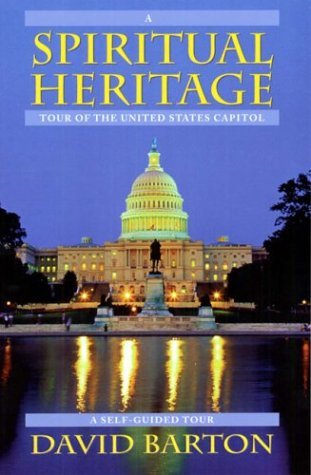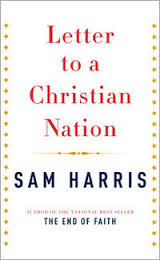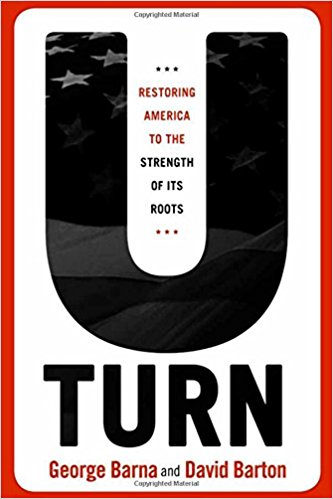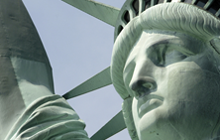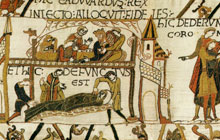Next, the debate moves to the perennial tug-of-war over historical fact. Many academics find it convenient to rewrite or leave out aspects of the past when teaching history so as to bolster their particular viewpoints of what history teaches us. For more on this issue, see the Thinker Education course experience, Is Historic Revisionism a Problem? This revisionism holds true in our current discussion as well. For many, history has become a form of hero worship. The political or moral bias of the historian becomes the basis for choosing who to call a hero and who to call a villain.
One particularly insightful essay is the following by Mark David Hall. For the sake of brevity, his conclusions are printed below, but the full essay can be read here.
Even though Christianity is not mentioned in the Constitution or Bill or Rights, the Founders of the American republic were influenced by Christian ideas in significant ways. For example:
1. Their faith taught them that humans were sinful. As James Madison wrote in Federalist No. 51, “If men were angels, no government would be necessary. If angels were to govern men, neither external or internal controls on government would be necessary.” This conviction led them to avoid utopian experiments such as those later pursued during the French Revolution and to adopt a constitutional system characterized by separated powers, checks and balances, and federalism. Many Enlightenment thinkers in this era, by way of contrast, tended to favor a strong, centralized government run by experts.
2. They firmly believed that God ordained moral standards, that legislation should be made in accordance with these standards, and that moral laws took precedence over human laws. This conviction manifests itself in their abstract reflections (e.g., James Wilson’s law lectures, parts of which read like St. Thomas Aquinas’s Summa Theologica) and practical decisions (e.g., all but one Supreme Court Justice prior to John Marshall argued publicly that the Court could strike down an act of Congress if it violated natural law).
3. Similarly, Christianity informed the Founders’ understanding of substantive concepts such as “liberty.” Barry Shain has identified eight different ways in which the word was used in the 18th century. Only one of these is related to the excessively individualistic way the term is often used today. Instead, the Founders were far more likely to see liberty as the freedom to do what is morally correct, as illustrated by United States Supreme Court Justice James Wilson’s marvelous dictum: “Without liberty, law loses its nature and its name, and becomes oppression. Without law, liberty also loses its nature and its name, and becomes licentiousness.”
4. America’s Founders believed that humans were created in the imago dei—the image of God. Part of what this means is that humans are reasonable beings. This led them to conclude that we the people (as opposed to the elite) can order our public lives together through politics rather than force. It also helped inform early (and later) American opposition to slavery.
5. Faith led many Founders to conclude that religious liberty should be extensively protected. Yet many also thought that civic authorities should encourage Christianity and that it is appropriate to use religious language in the public square. By the late 18th century, some Founders were beginning to question the wisdom of religious establishments, primarily because they thought that such establishments hurt true religion. The Founders’ views on these questions have the most immediate and obvious policy and legal implications, so I will address them in some detail.
James Madison
The Founders on Church and State
In the 1947 Supreme Court decision of Everson v. Board of Education, Justice Wiley Rutledge proclaimed that “no provision of the Constitution is more closely tied to or given content by its generating history than the religious clause of the First Amendment. It is at once the refined product and the terse summation of that history.” Like many jurists and academics since, he proceeded to argue that the Founders intended the First Amendment to create a strict separation of church and state. As evidence, he relied almost solely on statements by Thomas Jefferson and James Madison, most taken out of context and made before or well after the Religion Clauses were drafted.
Yet consideration of a wide range of Founders and their public actions shows that few if any embraced anything approximating modern conceptions of the separation of church and state. Of course, they differed among themselves, but it is possible to identify three major areas of agreement with respect to religious liberty and church–state relations.
Consensus #1: Religious Liberty Is a Right and Must be Protected.
To a person, the Founders were committed to protecting religious liberty. This conviction was usually based upon the theological principle that humans have a duty to worship God as their consciences dictate. A good illustration of this is George Mason’s 1776 draft of Article XVI of Virginia’s Declaration of Rights. It reads:
That as Religion, or the Duty which we owe to our divine and omnipotent Creator, and the Manner of discharging it, can be governed only by Reason and Conviction, not by Force or Violence; and therefore that all Men shou’d enjoy the fullest Toleration in the Exercise of Religion, according to the Dictates of Conscience, unpunished and unrestrained by the Magistrate….
James Madison, in his first significant public act, objected to the use of “toleration” in the article, believing that it implied that religious liberty was a grant from the state that could be revoked at will. The Virginia Convention agreed, and Article XVI was amended to make it clear that “the free exercise of religion” is a right, not a privilege granted by the state.
Mason’s draft of Article XVI was reprinted throughout the states and had an important impact on subsequent state constitutions and the national Bill of Rights. By the end of the Revolutionary era, every state offered significant protection of religious liberty. The federal Constitution of 1787 did not, but only because its supporters believed the national government did not have the delegated power to pass laws interfering with religious belief or practice. In the face of popular outcry, the first Congress proposed and the states ratified a constitutional amendment prohibiting Congress from restricting the free exercise of religion.
Consensus #2: States Should Have Established Churches Only If They Encourage and Assist Christianity.
In 1775, at least nine of the 13 colonies had established churches. Although establishments took a variety of forms, they generally entailed the state providing favorable treatment for one denomination—treatment which often included financial support. Members of religious denominations other than the official established church were usually tolerated, but they were occasionally taxed to support the state church, and some were not permitted to hold civic office.
After independence, most states either disestablished their churches (particularly states where the Church of England was previously established) or moved to a system of “plural” or “multiple” establishments. Under the latter model, citizens were taxed to support their own churches. Although a few Founders challenged establishments of any sort in the name of religious liberty, most arguments were framed in terms of which arrangement would be best for Christianity.
Consensus #3: Religion Belongs in the Public Square.
In 1802, Thomas Jefferson penned a letter to the Danbury Baptist Association in which he famously suggested that the First Amendment created a “wall of separation between Church & State.” This metaphor lay dormant with respect to the Supreme Court’s Establishment Clause jurisprudence until 1947, when Justice Hugo Black seized upon it as the definitive statement of the Founders’ views on church–state relations.
As appealing as the wall metaphor is to contemporary advocates of the strict separation of church and state, it obscures far more than it illuminates. Leaving aside the fact that Jefferson was in Europe when the Constitution and Bill of Rights were written, that the letter was a profoundly political document, and that Jefferson used the metaphor only once in his life, it is not even clear that it sheds useful light upon Jefferson’s views, much less those of his far more traditional colleagues.
Jefferson issued calls for prayer and fasting as governor of Virginia, and in his revision of Virginia’s statutes, he drafted bills stipulating when the governor could appoint “days of public fasting and humiliation, or thanksgiving” and to punish “Disturbers of Religious Worship and Sabbath Breakers.” As a member of the Continental Congress, he proposed that the nation adopt a seal containing the image of Moses “extending his hand over the sea, caus[ing] it to overwhelm Pharaoh,” and the motto “Rebellion to tyrants is obedience to God.” He closed his second inaugural address by encouraging all Americans to join him in seeking “the favor of that Being in whose hands we are, who led our forefathers, as Israel of old….” And two days after completing his letter to the Danbury Baptists, he attended church services in the U.S. Capitol, where he heard John Leland, the great Baptist minister and opponent of religious establishments, preach.
The point is not that Jefferson was a pious man who wanted a union between church and state. His private letters make it clear that he was not an orthodox Christian, and his public arguments and actions demonstrate that he favored a stricter separation between church and state than virtually any other Founder. Yet even Jefferson, at least in his actions, did not attempt to completely remove religion from the public square, and what Jefferson did not completely exclude, most Founders embraced.
America’s Founders did not want Congress to establish a national church, and many opposed establishments at the state level as well. Yet they believed, as George Washington declared in his Farewell Address, that of “all the dispositions and habits which lead to political prosperity, Religion and morality are indispensable supports.” Moreover, almost without exception, they agreed that civic authorities could promote and encourage Christianity and that it was appropriate for elected officials to make religious arguments in the public square. There was virtually no support for contemporary visions of a separation of church and state that would have political leaders avoid religious language and require public spaces to be stripped of religious symbols.
Conclusions
So did America have a Christian Founding? History is complicated, and we should always be suspicious of simple answers to difficult questions. As we have seen, there is precious little evidence that the Founders were deists, wanted religion excluded from the public square, or desired the strict separation of church and state. On the other hand, they identified themselves as Christians, were influenced in important ways by Christian ideas, and generally thought it appropriate for civic authorities to encourage Christianity.
What do these facts mean for Americans who embrace non-Christian faiths or no faith at all? Although the Founders were profoundly influenced by Christianity, they did not design a constitutional order only for fellow believers. They explicitly prohibited religious tests for federal offices, and they were committed to the proposition that all men and women should be free to worship God (or not) as their consciences dictate.
As evidenced by George Washington’s 1790 letter to a “Hebrew Congregation” in Newport, Rhode Island, the new nation was to be open to a wide array of individuals who were willing to assume the responsibilities of citizenship:
All [citizens] possess alike liberty and conscience and immunities of citizenship. It is now no more that toleration is spoken of, as if it was by the indulgence of one class of people, that another enjoyed the exercise of their inherent natural rights. For happily the Government of the United States, which gives to bigotry no sanction, to persecution no assistance requires only that they who live under its protection should demean themselves as good citizens, in giving it on all occasions their effectual support.
…May the Children of the Stock of Abraham, who dwell in this land, continue to merit and enjoy the good will of the other Inhabitants; while every one shall sit in safety under his own vine and fig tree, and there shall be none to make him afraid. May the father of all mercies scatter light and not darkness in our paths, and make us all in our several vocations useful here, and in his own due time and way everlastingly happy.
Yet it does not follow from this openness that Americans should simply forget about their country’s Christian roots. Anyone interested in an accurate account of the nation’s past cannot afford to ignore the important influence of faith on many Americans, from the Puritans to the present day.
Christian ideas underlie some key tenets of America’s constitutional order. For instance, the Founders believed that humans are created in the image of God, which led them to design institutions and laws meant to protect and promote human dignity. Because they were convinced that humans are sinful, they attempted to avoid the concentration of power by framing a national government with carefully enumerated powers. As well, the Founders were committed to liberty, but they never imagined that provisions of the Bill of Rights would be used to protect licentiousness. And they clearly thought moral considerations should inform legislation.
America has drifted from these first principles. We would do well to reconsider the wisdom of these changes.
The Founders believed it permissible for the national and state governments to encourage Christianity, but this may no longer be prudential in our increasingly pluralistic country. Yet the Constitution does not mandate a secular polity, and we should be wary of jurists, politicians, and academics who would strip religion from the public square. We should certainly reject arguments that America’s Founders intended the First Amendment to prohibit neutral programs that support faith-based social service agencies, religious schools, and the like.
Finally, we ignore at our peril the Founders’ insight that democracy requires a moral people and that faith is an important, if not indispensable, support for morality. Such faith may well flourish best without government support, but it should not have to flourish in the face of government hostility.






